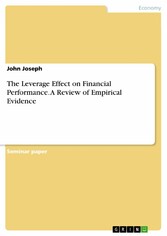The Leverage Effect on Financial Performance. A Review of Empirical Evidence
von: John Joseph
GRIN Verlag , 2018
ISBN: 9783668733077
, 26 Seiten
Format: PDF
Kopierschutz: frei
Preis: 16,99 EUR
eBook anfordern 
Mehr zum Inhalt

The Leverage Effect on Financial Performance. A Review of Empirical Evidence
Seminar paper from the year 2018 in the subject Business economics - Business Management, Corporate Governance, , language: English, abstract: The International Financial Reporting Standards (IFRS) is a high quality and principle based reporting standards that remove many accounting alternatives. It is therefore, consequently expected to limit the management's discretion and lessen practices on earnings management. Quite the opposite, some researchers argue that the flexibility in IFRS and its fair value pre-eminence might afford greater opportunities for firms to manage earnings. It is this inaptness which incited and aggravated the conduct of this study. This study applies a desktop review to investigate the worldwide existing empirical research evidence on the effect of IFRS on earnings management post- IFRS adoption and in relation to other reporting standards and reports whether the results are indistinguishable between developed and developing economies. Accounting research in developed economies has long identified earnings management as a means by which managers manipulate financial reports to mislead other stakeholders on the underlying economic performance of the firm. However, earnings management research did not receive much attention in developing countries such as Nigeria until recently. The findings reveal that the existing empirical crams and conclusions there on are mixed, inconsistent and difficult to generalise. This indicates the pressing need for country, especially Nigeria to engage on studies of this nature. The study further, stumbles on the fact that IFRS can indistinctly benefit both developing and developed markets when coupled with appropriate effective enforcement machinery. Substantially, the results entail that IFRS is a critical determinant for quality reporting but not a 'prima facie' guarantor for quality reporting.











